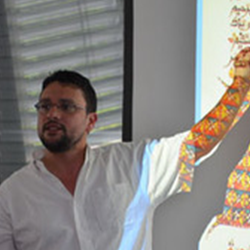
A talk by Andrea Brigaglia, University of Naples, "L'Orientale."
You may join the talk in person (lunch will be served) or by Zoom at https://tinyurl.com/3cey9k2a
Advance registration is required for Zoom participation.
Abstract: In discussing one of the most original poems in Hausa ajami (Arabic script) written by Shaykh Abubakar Atiƙu Sanka (d. 1974), this paper will raise questions related to the relationship between forms and function in Nigerian Islamic literature.
The paper is based on an ongoing project that analyses a wide literary corpus (ca. 2000 writings in Arabic and in Hausa) produced by approximately 300 authors that belonged to a single Islamic (Sufi) religious network, active in Nigeria from the 1950s to date. The poetic tradition from within which this corpus is produced, is normally based on a structural unity between a set of accepted genres and sub-genres (eulogy, elegy, chronicle, didactic versification, homiletic poems, etc.), their formal characteristics, and their expected “functions” or purposes. In normal circumstances, the simple title of any given poetic or prose text of this corpus, contains clear indications that allow the reader to locate it within one or the other of the customary genres and sub-genres; to expect it to have certain stylistic feature that typically belong to the genres in question; and most importantly, to expect the text to be “used” by the reader in a specific context.
The poem here discussed, however, apparently breaks the above unity. It presents itself, at first, as a eulogy, which would be typically expected to be used in the context of an intercessory prayer. As the eulogy is addressed at a culinary item (the cassava flour), however, the poem can also be seen as a humorous play. Written in 1942, in the midst of WW2, gradually the poem discloses another possible intent as a historical chronicle (tārīkh), when the cassava flour appears to stand as a symbol of the British army, while the foods it competes with in the Nigerian kitchens are identified with the adversaries that the latter fought during the war. More subtly, however, the poem also discloses a further possible reading, as the reference of the symbolism of the cassava flour is transferred, through a set of allusions, to the highest station of Sufi hagiology, the “Pole of the Poles” (Quṭb al-aqṭāb) or “Saviour of the Era” (Ghawth al-zamān). Through the gradual disclosure of this symbolism, the poem appears once again – as its formal traits originally suggested – as a Sufi praise addressed at a saintly figure and meant to be recited as an intercessory ode. After apparently breaking the customary unity between genre, form, intent and function, on which the poetic tradition of its author is based, the “Chronicle of the Cassava Flour” recomposes it in an unexpected fashion and shows that the deepest intent of the author was actually to compose a praise / intercession to a “saint”, albeit masking his intent, by recurring to culinary and historical symbols, in a humorous fashion.
Andrea Brigaglia is associate professor in the Asia, Africa, and the Mediterranean department at the University of Naples, "L'Orientale." His research and teaching are focused in the area of Islam in Africa, with a special emphasis on West Africa (Nigeria) and on the role of Muslim scholars in the region's intellectual history. He has published or conducted research on the formation of scholarly networks of the Tijaniyya Sufi order in Nigeria, Ghana and Tunisia; on Qur'anic exegesis in Northern Nigeria; on twentieth century religious literature in Nigeria (in Hausa and Arabic); on manuscript collections in Abeche (Chad); and on the ideological origins of Boko Haram.
Audience
- Faculty/Staff
- Student
- Public
- Post Docs/Docs
- Graduate Students
Interest
- Academic (general)
- Religious/Spiritual
- Global/Multicultural
- Community Engagement